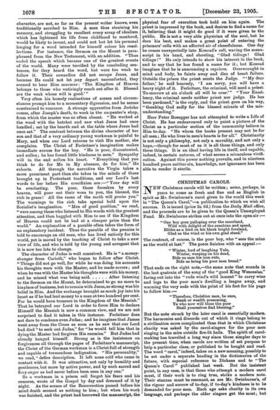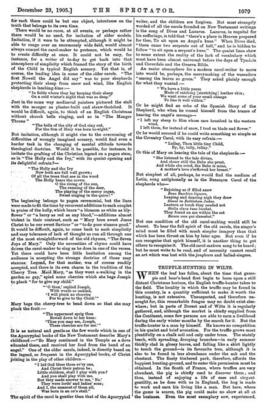" Ono boy goes galloping over the moorland, Wild with
delight of the sunshine and speed, Blithe as a bird on his bleak bright foreland, Glad as the wind or his own glad steed."
The contrast, of course, is the poor boy, who " sees the mine as the world at last." The poem finishes with an appeal :-
" Winter, lord of laughing Yule, Winter, weeping on his dead, Bids us ease his iron rule, Bids us bring his poor men bread."
That ends on the right note,—the same note that sounds in the last quatrain of the song of the "good King Wenceslas," faring out into the " rude wind's wild lament " to carry wine and logs to the poor man's dwelling a league away, and warming the very sods with the print of his feet for his page to follow him :- "Therefore, Christian men, be sure, Rank or wealth possessing,
Ye who now will bless the poor Shall yourselves find blessing."
But the note struck by the later carol is essentially modern. The harmonies and discords out of which it rings belong to a civilisation more complicated than that in which Christmas charity was asked by the carol-singers for the poor men singing in the mire outside fire-lit halls. The spirit of carol- making has travelled a long way since those simpler days to the present time, when carols are written of set purpose to help a particular class, or published to be bought and read. The word " carol," indeed, takes on a new meaning, possibly to be set under a separate heading in the dictionaries of the future, with especial reference to Dickens and to " The Queen's Carol " published last week. But the insistent point, in any case, is that those who attempt a modern carol must, if their work ie to ring true, strike a modern note. Their stanzas must be resonant, as are Mr. Swinburne's, of the vigour and sorrow of to-day, if to-day's kindness is to be demanded for poor men. Each age asks charity in its own language, and perhaps the older singers get the most; but 'There would be no room, at all events, or perhaps rather there would be no need, for imitation of older models. Imitation, if it were to be attempted, although it might be able to range over an enormously wide field, would almost always compel the carol-maker to pretence, which would be to create difficulty at once. It could not be easy, for instance, for a writer of to-day to get back into that atmosphere of simplicity which framed the story of the birth of the Child in typical English scenery. Yet that is, of course, the leading idea in some of the older carols. "The first Nowell the Angel did say " was to poor shepherds protecting their sheep from snow and wind, like English shepherds in lambing-time :— " In fields where they lay keeping their sheep On a cold winter's night that was so deep."
Just in the same way mediaeval painters pictured the stall with the manger as plaster-built and straw-thatched. It would be difficult, again, to think of an English Christmas without church bells ringing, and so in " The Manger Throne "
"The bells of the city of God ring out,
For the Son of Mary was born to-night."
But imitation, although it might rise to the overcoming of difficulties of wrongly imagined scenery, would find even a harder task in the changing of mental attitude towards theological doctrine. Would it be possible, for instance, to imitate the grafting of the Christian legend on a pagan stem, as in " The Holly and the Ivy," with its quaint opening and its delightful refrain?—
" The Holly and the Ivy
Now both are full well grown ; Of all the trees that are in the wood The Holly bears the crown.
0 the rising of the sun, The running of the deer, The playing of the merry organ, Sweet singing in the quire !"
The beginning belongs to pagan ceremonial, but the lines were made to fit the time by recurrent additions to each couplet in praise of the holly, which bears " a blossom as white as lily- flower " or " a berry as red as any blood,"—additions almost violent in their contrast, such as " Mary bore sweet Jesus Christ to be our sweet Saviour " or "to do poor sinners good." It would be difficult, again, to come back to such simplicity and easy tolerance of lack of thought as run all through one of the most straightforward of the old rhymes, " The Seven Joys of Mary." Only the necessities of rhyme could have driven the carol-maker to sing as he does in one of the verses.
Yet there could have been little hesitation among the audience in accepting the strange doctrine of those easy stanzas. Legend, for that matter, was of course readily accepted, and there is its own charm in the tradition of the Cherry Tree. Maid Mary, " as they went a-walking in the garden so gay," spied some cherries which she begs Joseph to.pluck ".for to give my child."
"‘ 0 then,' replied Joseph, With words so unkind, will pluck no cherries For to give to thy Child."
Mary begs the cherry-tree to bend down so that she may pluck the fruit :— "The uppermost sprig then Bowed down to her knee:
`Thus you may see, Joseph, These cherries are for me."
It is as natural and gentle as the few words which in one of the Apocryphal books of the New Testament describe Mary's childhood :—" So Mary continued in the Temple as a dove educated there, and received her food from the hand of an
angel." One of the older carols, indeed, is directly based on the legend, so frequent in the Apocryphal books, of Christ
joining in the play of other children— "I bid God bless them ev'ry one, And Christ their patron be;
Little children, shall I play with you?
And you shall play with me.
But they made answer to me, No.' They were lords' and ladies' sons; And I, the meanest of them all, Was born in an ox's stall."
The spirit of the carol is gentler than that of the Apocryphal writer, and the children are forgiven. But most strangely worded of all the carols founded on New Testament writings is the song of Dives and Lazarus. Lazarus, in requital for his sufferings, is told that " there's a place in Heaven prepared for thee, To sit upon an Angel's knee." When Dives died, "there came two serpents out of hell," and he is bidden to follow " to sit upon a serpent's knee." The quaint lines show to some extent the reality of the lack of vocabulary which must have been almost universal before the days of Tyndale and Coverdale and the Geneva Bible.
An easier atmosphere for a modern carol-writer to move into would be, perhaps, the merrymaking of the wassailers "among the leaves so green." They asked plainly enough for what they wanted :-
" We have a little purse
Made of ratching, [stretching] leather skin; We want some of your small change To line it well within."
Or he might find an echo of the Spanish Story of the Shepherd, who when he roused himself from the trance of hearing the angel's message— "I left my sheep to Him whose care breathed in the western wind,
I left them, for instead of snow, I trod on blade and flower."
Or he would succeed if he could write something so simple as the Coventry Carol, with its easy refrain :— " Lullay, Thou little tiny Child, By, by, lully, lullay."
Or this of Mary on hearing the tale of the shepherds :-
" She listened to the tale divine,
And closer still the Babe she prest, And while she cried, the Babe is mine, A mother's love o'erflowed her breast."
But simplest of all, perhaps, he would find the medium of Latin, sung antiphonally as in the Besancon Carol of the shepherds who-
" Rejoicing as if filled anew Bono Bacchico liquore,
Leaping and dancing nigh they drew Simla in Bethlehem Judas.
Lantern or torch they needed not Stella clara tune lucebat, They found an ass within the cot Rauca voce qui ciamabat."
But one condition of the old carol-making would still be absent. To hear the full spirit of the old carols, the singer's mind must be filled with much simpler imagery than that which has been thrust on him by later ages. But even if he can recognise that spirit himself, it is another thing to get others to recognise it. The old carol-makers sang to be heard ; but he must write to be read, and of necessity cannot recall an art which was lost with the jonglcurs and ballad-singers.







































 Previous page
Previous page